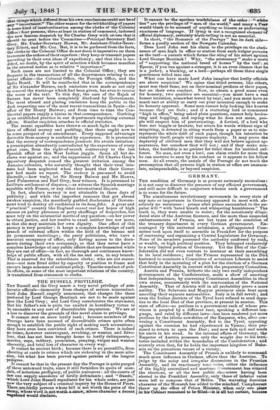THE RUSSELL PRIVILEGE.
-THE Russell and the Grey assert a very novel privilege of aris- tocratic officials—immunity from charges of serious misconduct. Lord John Russell, angrily announces, that charges like those -preferred. by Lord George Bentinck are not to be made against men like Lord Grey ; and Lord Grey corroborates the statement, that his father's son is quite too exalted in hereditary virtue to be amenable to any sort of discreditable imputation. We are at a loss to discover the grounds of this novel claim to privilege. It cannot rest on mere lordly rank ; because members of the 'Peerage have been accused of discreditable crimes quite often .enough to establish the public right of making such accusations ; they have even been convicted of such crimes. There is indeed no crime, however extravagant, revolting, or wanton and frivo- lous, that has not been brought home to lordly delinquents,— 'murder, -rape, - robbery, peculation, pimping,--vulgar and wanton obscenity, and total loss of character in every, way.
It cannot be ancient birth; because there is no peccadillo, from cheating at cards to crimes which are sickening in the.niere allu- -sion, but what has been proved against persons of the longest 'pedigree.
It cannot be-that in the present day the Peerage is quite purged Of these untoward traits, since it still furnishes its quota of scan- . dale, of notorious profligacy, of public nuisances : all the courts of law can supply anecdotes of lordly, defendants ; And "frauds," 'Which Lord John Russell repudiates' for his whole order, are just now the very subject of a criminal inquiry by the House of Peers. Therearelordly persons whose bill is not worth the price of the stamp, whose word is not worthitatntw,..athose character a decent Vagabond would disclaim. It cannot -be 'theapotless 'truthfulness of the-order : • " white lies" are the privilege of "men of the world," and many a Peer would blush to-be accused of anything so bizarre as undeviating exactness of language. If lying is not a recognized element of official diplomacy, eertainly,truth-telling-is not an-essential.
In short, "the Romance of the Peerage" has its dark side— forms a goodly section of the Newgate Calendar.
'Does Lord John rest his claim to the privilege on the absti- nence of men high -in office or station from such vulgar pursuits as the turf—a pursuit which.forms.the sting of his retort against Lord George Bentinck? Why, ".the aristocracy" make a merit of "supporting the national breed of horses" by the turf: at
• Epsom, if you run against a stranger, it is an-even chance that lie is a jockey, a blackleg, or a lord—perhaps all those-three-single gentlemen rolled into one.
What can have made Lord John imagine that lordly officials are above suspicion! We opine that titled persons, like others, must rest their fame, not on theirnominal prefixes or their papas, but on their own conduct. Now, to obtain a good name even for honesty, two qualities are essential—you must have a real honest intention, somewhat tested by trial ; and you must have AO much tact or ability as carry out your intention enough to make its honesty apparent. Some men cannot help looking like knaves because they are fools ; and if a stuttering lord or commoner "high in office," being asked plain questions, cannot help hesita- ting and boggling, and saying what he does not mean, peo- ple will suspect him of prevaricating. A fortiori, if a lord who does not boggle or hesitate, but utters his words without sign of misgiving, is detected in citing words from a paper so as to mis- represent the whole drift of such paper, though his intention be simplicity itself, people will impute duplicity. It -may prove the depravity of civilized men that they will not believe against ap- pearances, but somehow they will not ; and if they make mis- takes, the hardship is no greater for titled 'than for untitled suf- ferers. No man, not even a lord, can claim credit for more than he can contrive to earn by his conduct as it appears to his fellow men. -At all events, the annals of the Peerage do not teach the presumption that all persons high in station or office are immacu- late, unimpeachable, or beyond suspicion.


























 Previous page
Previous page